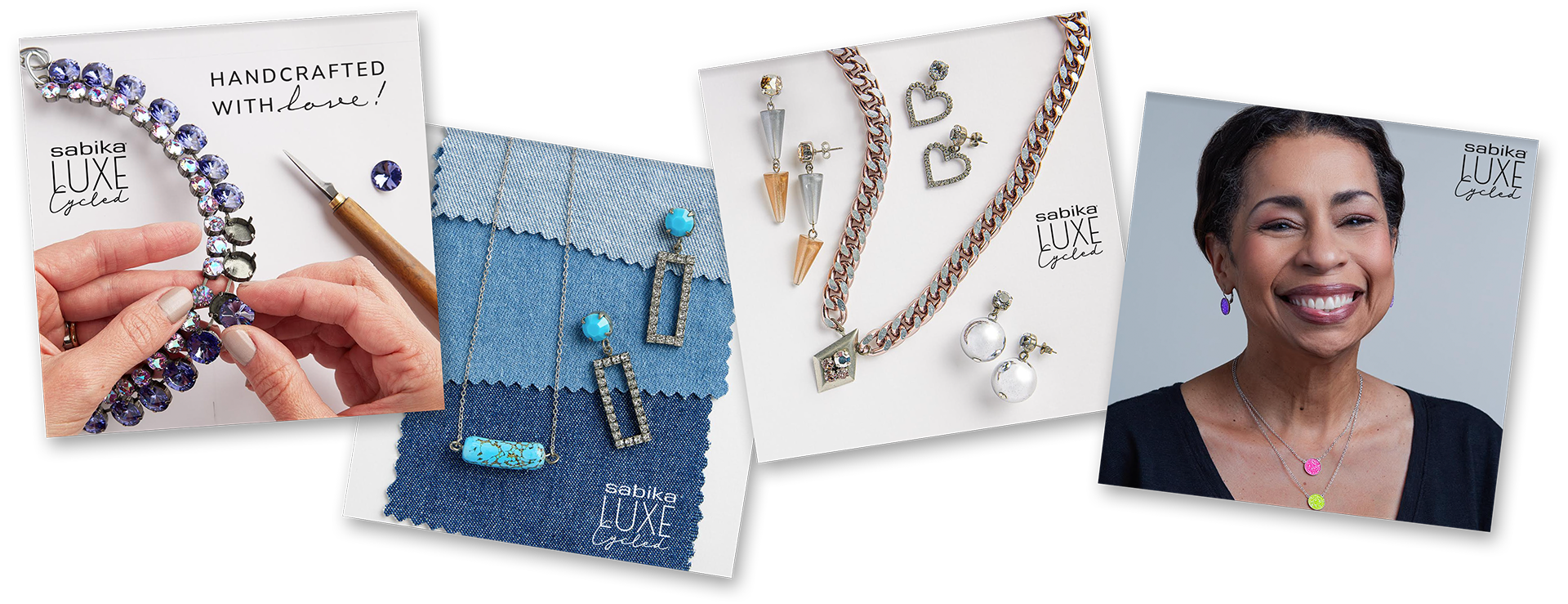
Luxe-Cycled Fashion? Yes, please!
by Natalie Bencivenga
September 1, 2023

I recently interviewed Alexandra Mayr-Gracik, the CEO and head designer of Sabika to talk about their commitment to the slow fashion movement and why their new luxe-cycled accessories are both chic and sustainable!
What is slow fashion? Slow fashion promotes ethical production and advocates for the respect of people and the environment in the manufacturing process. At Sabika we create curated collections using only handmade, quality elements versus creating mass amounts of trendy throw-away pieces. We stay on-trend but our pieces are not “trendy,” allowing our clients to mix and match and love their pieces for many years. Our components are sourced from small European vendors, many family businesses, who produce in eco-conscious ways. In addition, our jewelry is handcrafted by highly trained and skilled artisans who are continuing centuries old European traditions and techniques. Sabika has been able to help revive a cottage industry that was struggling for many years.
What is the difference between fast fashion and slow fashion? Fast fashion allows brands to keep up with the latest trends at a rapid pace making prices low and ease of accessibility high for consumers to purchase trendy and “disposable” items at extremely low prices. This gives customers a cheaper way to stay on trend. But at what cost? Known for its exploitative practices, the hope is that people begin to better understand why it is not a sustainable model.
On the flip side, slow fashion is not meant to be worn once and thrown away. Slow fashion takes the manufacturing process into deep consideration. Who is making it? What are their working conditions? Are they being paid fairly? What impact on the environment does my company have? Key factors include promoting ethical production methods and prioritizing the fair treatment of workers as well as the use of sustainable processes and materials.
Why should we move away from fast fashion? One reason is that brands using fast fashion business models are simply not using sustainable manufacturing processes. The creation of excessive production of textiles creates more waste and ultimately more items ending up in a landfill. Actually, three out of every five fashion items end up in a landfill, according to the Clean Clothes campaign. In addition, fast fashion tends to be manufactured in unsafe environments with wages barely enough to cover the cost of a single meal.
We see the term “ethically made” more and more when it comes to fashion. But what does it mean? When something is ethically made there are many factors to consider. To be “ethically made,” the manufacturing process should support safe working conditions and respect basic human and environmental rights.
Why did Sabika decide to move into the slow fashion space with the new initiative, Luxe-Cycled? Sabika has always embraced this model and one of our founding principles is sustainability. All Sabika products are handcrafted in Europe and are held to the highest European Union standards of eco-conscious manufacturing — the highest in the world. We care about the lasting impact of our business on the environment. We always want to limit waste by using vintage components or even remnants from productions that can be utilized in new ways. The Luxe-Cycled Collection celebrates 22 years of design philosophy in new beautiful pieces using components from past collections brought back in fresh new styles. We can't wait to see how these new designs unlock beautiful, joyful moments every time they are worn.
Familiar components made new again, these pieces are designed to be experienced and styled in completely new ways. Heirloom elements also speak to Sabika’s foundation of sustainability to create and market jewelry in a responsible and conscious way that acknowledges environmental and socioeconomic impacts. It’s our way of being mindful as well as our way to honor the time and craftsmanship of each vintage element.
What do you see for the future of the fashion industry? I would like to see more people move away from the idea of “fashion” and towards the idea of “style” as a language to communicate who you are. I think when we develop our style, even if it changes over time, we are less focused on what we think we need to fit in and more thoughtful about the items we purchase that will have more permanence in our lives. Unfortunately fast fashion probably isn’t going anywhere anytime soon. However, I think by creating a sense of pride in the things we own — not meaning the emphasis on cost or boasting expensive items, but the pride of ownership could aid in educating consumers on the negative impacts of fast fashion and make them more thoughtful about what and how they buy.
Want to up your style game? Sabika Stylists (formerly Sabika Consultants) are now offering “Styling Sessions” to help clients unlock their personal style. It’s a great way to refresh your style with some pieces from Sabika’s Fall 2023 Collection, launching on September 1, 2023 as well as the upcoming Pink Collection in October 2023 to support BCRF and Cancer Bridges.
NOTE: This collection is only available through August 31st. But as noted throughout the Q&A, Sabika uses sustainable practices throughout all of their collections.

Wow , thank you for covering this story. Just another reason that I’m happy to be a Sabika Stylist.